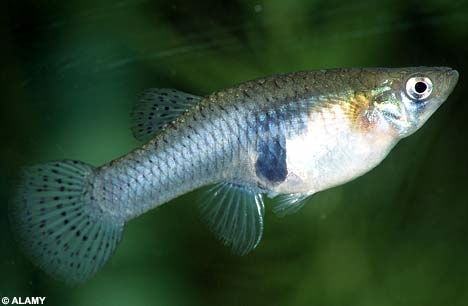(单词翻译:单击)
The southern Chinese city of Guangzhou has introduced a fish that eats mosquito larvae, in an effort to control its worst-ever dengue fever outbreak, state news media have reported. Some scientists have warned that use of the nonnative mosquito fish could have unexpected consequences, while others say that mosquito fish are already found in Guangdong waters and the environmental impact might not be significant, but that the effectiveness of the fish may also be limited.
据国家媒体报道,为了控制当地有史以来最严重的登革热疫情,中国南方城市广州引进了一种吃蚊子幼虫的鱼。一些科学家警告说,投放外来物种食蚊鱼可能会产生意想不到的后果,但也有人说,广东水域中已有食蚊鱼,因此其环境影响可能不会太大,但这种鱼的效果可能也很有限。

As of Monday, the number of dengue cases in Guangdong Province this year had reached 41,155, the local health authorities reported, with six deaths. The province has seen 200 to 300 new cases a day in recent days. That is lower than the more than 400 per day last week and the more than 1,000 per day the week before that, offering some hope that the outbreak is beginning to ease.
据当地卫生部门报告,截至周一,广东省今年的登革热发病人数已经达到41,155人,其中有六人死亡。最近几天中,全省每天有200到300个新病例出现。这比上周每天400例的新增病例要低,也比上上周的每天1,000例低得多,为疫情开始缓解带来一些希望。
Guangzhou, the capital of Guangdong and China’s third-largest city, has seen the most cases, with more than 34,000 reported infections and one death, followed by the city of Foshan, with more than 3,000 cases and one death.
中国第三大城市、广东省省会广州市的疫情最严重,已有超过34,000个报告的感染病例、一人死亡,其次是佛山市,有3,000多个病例、一人死亡。
The dengue virus, which is carried by Aedes mosquitoes, can cause extreme fever, headaches, and muscle and joint pain in infected humans, though death is rare when proper treatment is provided. China has traditionally not seen large-scale outbreaks, but widespread urbanization and climate change have made warmer coastal areas increasingly hospitable to the mosquitoes that spread the virus.
登革热病毒通过伊蚊传播,能在被感染者身上引起高烧、头痛,以及肌肉和关节疼痛,但在有适当治疗的情况下,很少有患者会死亡。中国很久以来已未曾出现过大规模的登革热爆发,但大范围的城市化、以及气候变化让较温暖的沿海地区越来越有利于传播病毒的蚊子生存。
Officials, blaming the outbreak this year on inadequate mosquito control efforts, have increased the application of pesticides in Guangzhou in an effort to reduce the insect population. The city’s water bureau also announced on Oct. 15 that it had introduced mosquito fish from North America to “controllable static waters,” Xinhua, the state-run news agency, reported.
官员把今年的疫情暴发归咎于控蚊工作做得不好,并已在广州增加了杀虫剂的使用,试图减少蚊子的数量。据国家通讯社新华社报道,广州水务局还在10月15日宣布,从北美引进了食蚊鱼以“控制静态水体”。
That move prompted criticism from some experts who suggested it could upset the ecological balance in Guangdong waterways.
此举遭到一些专家的批评,他们认为这个做法可能会破环广东水域的生态平衡。
“The best solution to the dengue problem is to improve the overall environment,” Li Yanliang, chairman of the National Aquatic Wildlife Conservation Association, told Xinhua. “Introducing foreign species must be meticulous. The impacts must be controlled.”
全国水生野生动物保护分会会长李彦亮对新华社说,“登革热的防治最好的办法是提高整体的环境,对外来物种的引进要慎重,严格控制外来物种带来的负面影响。”
Liu Hansheng, an official with the Administration of Oceans and Fisheries, told Guangzhou Daily that the fish were invasive and that their introduction should be carefully controlled.
广州市海洋与渔业自然保护区管理站救护部部长刘汉生对《广州日报》说,食蚊鱼是外来入侵物种,其投放应受到严格控制。
“Previously the nation brought them in to help control mosquitoes, but afterward they spread,” Mr. Liu told the newspaper. “Whether or not this leads to a disaster, the city of Guangzhou at present doesn’t have enough data to say.”
刘汉生对该报说,“此前国家是将其作为灭蚊的帮手引进中国的,但是后来就泛滥了,至于是否成灾,广州市暂时没有调查数据可以支撑。”
Guangzhou Daily reported that the small, finger-length fish were first brought to China in 1924 and introduced to West Lake in Hangzhou. The fish then spread to other bodies of water, and since 2006 they have been introduced to parks in Guangzhou to control mosquitoes.
《广州日报》报道说,中国在1924年首次引进这种手指长短的小鱼,投放在杭州的西湖。这种鱼后来扩散到其它水体,自2006年起,这种鱼被引进广州的公园,以控制蚊子。
“Mosquito fishes are already widespread all over southern Guangdong, and I would doubt very much that adding any more would have much effect — either on the mosquitoes or on the ecology of the receiving waters,” David Dudgeon, a professor of ecology and biodiversity at the University of Hong Kong, wrote in an email.
“食蚊鱼在广东南部已很普遍,因此我不觉得,引进更多鱼会产生多大影响,无论是对蚊子,还是对接纳水体的生态环境,”香港大学生态学及生物多样性教授杜德俊(David Dudgeon)在电子邮件中写道。
Scientific opinion on the effectiveness of the mosquito fish is divided, Dr. Dudgeon said. While the fish do eat mosquitoes, the insects are not the fish’s preferred food. And the mosquito fish can have a harmful effect by eating the eggs and larvae of other native species. If mosquitoes are breeding in flower pots, puddles and other small bodies of water where the fish aren’t introduced, then their effect will be further limited.
杜德俊说,科学家对食蚊鱼的有效性存在意见分歧。虽然这种鱼的确吃蚊子,但蚊子不是其首选食品。而食蚊鱼也吃其他本地物种的卵和幼虫,因此可能产生有害影响。如果蚊子在花盆、水坑和其他小水体中繁殖,而不把鱼引进这些水体的话,其作用将进一步受到限制。


